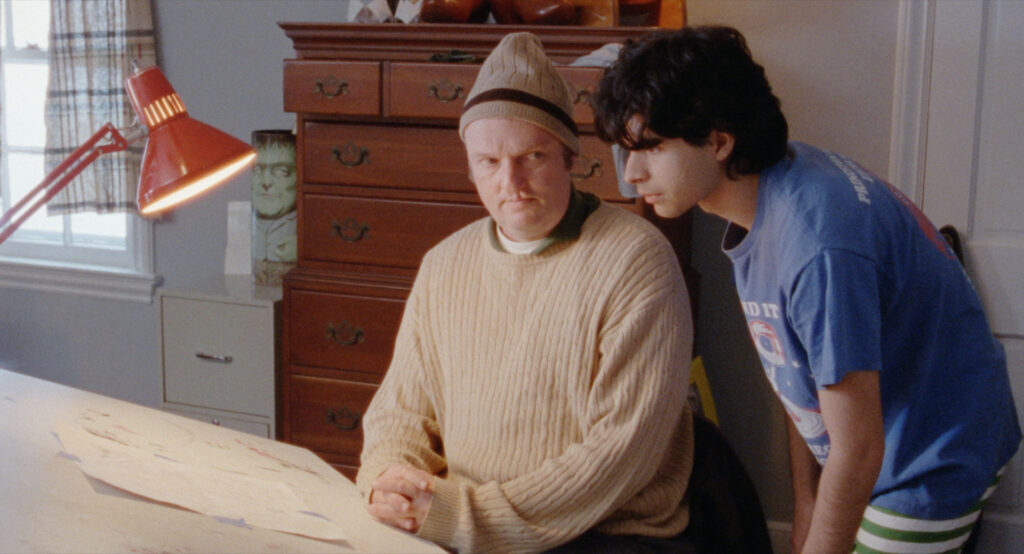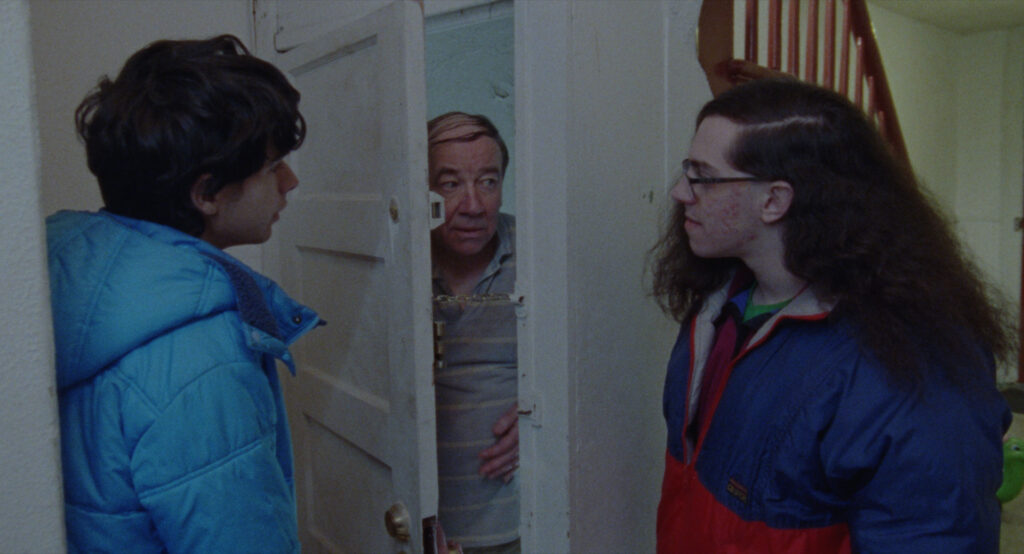Cannes Film Festival, Cleveland Thomas Jr., comedy, Daniel Zolghadri, drama, film festivals, Funny Pages, Josh Pais, Louise Lasser, Marcia DeBonis, Maria Dizzia, Matthew Maher, Michael Townsend Wright, Miles Emanuel, movies, Owen Kline, reviews, Ron Rifkin, Stephen Adly Guirgis
September 1, 2022
by Carla Hay

Directed by Owen Kline
Culture Representation: Taking place in New Jersey, the comedy/drama film “Funny Pages” features an all-white cast of characters representing the working-class and middle-class.
Culture Clash: A teenager defies his parents’ wishes by dropping out of high school and moving out of the family home to become a professional comic-book illustrator, and he meets a very eccentric would-be mentor along the way.
Culture Audience: “Funny Pages” will appeal mainly to people who are interested in low-key, quirky comedy/drama movies about comic book enthusiasts.

The comedy/drama “Funny Pages” is a very offbeat love letter to comic book fanatics and the extreme decisions some artists will make to pursue their dreams. The movie’s tone is inspired more by Charlie Kaufman than by Kevin Smith. “Funny Pages” had its world premiere at the 2022 Cannes Film Festival in Cannes, France.
“Funny Pages” is the feature-film directorial debut of writer/director Owen Kline, who is also known as an actor who had roles in 2001’s “The Anniversary Party” and 2005’s “The Squid and the Whale,” when Kline was a child. These experiences as a child actor no doubt informed the creation of “Funny Pages” protagonist Robert Bleichner (played by Daniel Zolghadri), an eccentric teen who wants to grow up fast and become an illustrator of comic books and comic strips that have sexually explicit, raunchy comedy.
Robert, who’s about 16 or 17 years old, lives with his parents Lewis (played by Josh Pais) and Jennifer (played by Maria Dizzia) in a typical middle-class home in Princeton, New Jersey. The beginning of “Funny Pages” is an indication of some of the weirdness throughout the movie. Robert is in a private meeting at the home of his art teacher Mr. Katano (played by Stephen Adly Guirgis), who is a fan of the type of rude and raunchy illustrations that Robert wants to draw.
Robert confides in Mr. Katano that he plans to drop out of high school, because Robert thinks that the places where he wants to work will only care about his talent and portfolio, not if he has a high school diploma. However, Mr. Katano doesn’t think that Robert has a strong-enough identity that comes through in Robert’s drawings. Mr. Katano tells Robert: “Everything in your portfolio needs to be clearly coming from who you are … Who do you draw for?”
Robert doesn’t have a definite answer to that question. Mr. Katano knows that Robert likes to draw pictures of naked people. The meeting takes a very unorthodox turn when Mr. Katano asks Robert if he wants to draw Mr. Katano. Robert says yes, and without hesitation, Mr. Katano taks off all of his clothes, except for a pair of socks. He stands up on his desk and tells Robert to do a nude sketch of him. Robert is a little surprised, but he does the sketch with a little discomfort.
Even though there was nothing sexual about Mr. Katano’s offer, it’s still extremely inappropriate for a teacher to get naked in front of an underage child who’s a student of the teacher’s. Mr. Katano knows it, and he has second thoughts about what he just did, especially after Robert finishes the sketch and quickly leaves because Robert says that he has to be home by a certain time. While Robert is walking home on a street near an expressway, Robert sees that Mr. Katano is following Robert in Mr. Katano’s car.
With the car window rolled down on the driver’s side, Mr. Katano tells Robert that he wants to make sure that what happened with the nude sketch session wasn’t something that made Robert feel threatened or embarrassed. Robert assures Mr. Katano that he thinks everything is just fine, and that what happened won’t change their student/teacher relationship. And then, out of nowhere, Mr. Katano’s car gets hit by another car speeding in the opposite direction. Mr. Katano is killed instantly.
After the funeral, Robert breaks into Mr. Katano’s home to steal some personal items that he’s sure that Mr. Katano (who lived alone and had no known relatives) would want him to have. A house alarm goes off, and Robert is arrested for the break-in. He has a public defender named Cheryl (played by Marcia DeBonis), who thinks Robert is an adorable and misunderstood kid, even though Robert is not as meek and nice as Cheryl initially thinks he is. She is able to get the charges dismissed by arguing to the court that Robert did the break-in out of grief, and he only took items that he thought were rightfully his. (Apparently, Mr. Katano didn’t leave a will.)
Mr. Katano’s death, Robert’s legal problems and the dismissal of Robert’s criminal case all happen in the first 20 minutes of “Funny Pages” and shown with some choppy editing. By the end of those 20 minutes, viewers will either be turned off from seeing the rest of this movie or curious to see what will happen next with this very unusual teenager. Many people in Robert’s life are skeptical that he will “make it” as a professional illustrator, but he is unwavering in trying to make his dream come true.
Much to his parents’ disapproval, Robert is so eager to get started on this career, he drops out of high school, moves out of the family home, and gets his own place: a rented room in a dirty and dumpy house in Trenton, New Jersey. Robert’s creepy and disheveled landlord Barry (played by Michael Townsend Wright), who also lives in the house, knows that Robert is underage, but Barry doesn’t care as long as Robert pays the rent. Robert shares the room with another weirdo tenant named Steven (played by Cleveland Thomas Jr.), who doesn’t talk much, but when Steven does talk, it’s often out loud to himself.
In his quest to become a comic book illustrator and in order to pay his bills, Robert takes a part-time job working at a comic book store. Robert also gets a part-time job working as an administrative assistant to Cheryl, who is highly amused when she finds out that Robert expresses his naughty side in his illustrations. Robert’s best friend (and only friend) is a former classmate named Miles (played by Miles Emanuel), a mild-mannered nerd who is in awe of Robert being able to have so much independence at a young age.
It’s through Robert’s job with Cheryl that Robert soon meets a hot-tempered, mentally ill man named Wallace Schearer (played by Matthew Maher), who was an assistant colorist at Image Comics. Wallace, who is one of Cheryl’s clients, got into trouble for having an emotional meltdown at a pharmacy and committing vandalism on the property. Robert meets Wallace when Wallace arrives at Cheryl’s office for an appointment.
Even though Wallace clearly has mental health problems, Robert is immediately intrigued when he finds out that Wallace used to work for Image Comics. It’s at this point in the movie that you know Wallace and Robert will go back to the pharmacy where Wallace committed his crime. Former “Mary Hartman, Mary Hartman” star Louise Lasser makes a disturbing cameo as a drugged-out and drooling pharmacy customer named Linda, who demands that Robert give her a Percocet. Ron Rifkin also makes a brief appearance in “Funny Pages,” as Robert’s unnamed grandfather.
Because of Wallace’s experience working at a well-known comic book publishing company, Robert becomes fixated on getting Wallace to mentor Robert. The rest of “Funny Pages” involves Robert’s strange encounters with people in the Trenton area and his desperate attempts to become Wallace’s student/protégé. Although none of the acting is terrible in “Funny Pages,” don’t expect to see a lot of pleasant characters in this movie.
There’s some violence, nudity and very dark comedy in this odd little film, but for people who are open to this type of movie-watching experience, “Funny Pages” has enough to hold viewers’ interest. “Funny Pages” is both a satire and a tribute to the single-minded passion that can consume artists to express themselves in their art. The movie has several mentions about whether or not an artist’s work has “soul.” In provocative and peculiar ways, “Funny Pages” examines if artists who pour their souls into their work might also lose their souls in the process.
